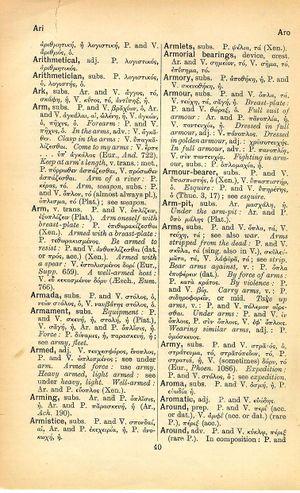aroma: Difference between revisions
Οὐ γὰρ ἀργίας ὤνιον ἡ ὑγίεια καὶ ἀπραξίας, ἅ γε δὴ μέγιστα κακῶν ταῖς νόσοις πρόσεστι, καὶ οὐδὲν διαφέρει τοῦ τὰ ὄμματα τῷ μὴ διαβλέπειν καὶ τὴν φωνὴν τῷ μὴ φθέγγεσθαι φυλάττοντος ὁ τὴν ὑγίειαν ἀχρηστίᾳ καὶ ἡσυχίᾳ σῴζειν οἰόμενος → For health is not to be purchased by idleness and inactivity, which are the greatest evils attendant on sickness, and the man who thinks to conserve his health by uselessness and ease does not differ from him who guards his eyes by not seeing, and his voice by not speaking
(1) |
(1) |
||
| Line 16: | Line 16: | ||
{{esel | {{esel | ||
|sltx=[[ἄρωμα]] | |sltx=[[ἄρωμα]] | ||
}} | |||
{{LaEn | |||
|lnetxt=aroma aromatis N N :: spice, aromatic substance; sweet odors (Bee) | |||
}} | }} | ||
Revision as of 23:15, 27 February 2019
English > Greek (Woodhouse)
subs.
Latin > English (Lewis & Short)
ărōma: ătis, n. (dat. and
I abl. plur. aromatibus, also aromatis, App. Flor. 4, 19; v. Neue, Formenl. I. p. 291), = ἄρωμα, a spice; in sing., Dig. 39, 4, 16, § 7; Prud. στεφ. 8, 72; id. Apoth. 826; in plur., spices (so only in Vulg.), Col. 12, 20, 2; Vulg. Gen. 37, 25; ib. Exod. 25, 6; ib. Marc. 16, 1; ib. Joan. 19, 40 et saepe.
Latin > French (Gaffiot 2016)
ărōma, ătis, n. (ἄρωμα), aromate : Col. Rust. 12, 20, 2.
dat.-abl. pl. aromatis Col. Rust. 12, 25, 4 ; Apul. M. 3, 17.
Latin > German (Georges)
arōma, atis, n. (ἄρωμα), Gewürz, ar. Indicum, Marcian. dig. 39, 4, 16. § 7: Sabaeum, Ven. Fort. 7, 12, 39: odor sparsi aromatis, Prud. apoth. 758: aromate tinctus, Prud. perist. 14, 72: acerra multo aromate gravidata, Mart. Cap. 2. § 115. – Plur. aromata, Cels. 3, 21. p. 107, 18 D. Col. 12, 20, 4. Isid. 17, 8, 1. Vulg. gen. 37, 25 u.a.: Genet. aromatum, Ulp. dig. 7, 5, 11. Vulg. exod. 31, 11: Dat. od. Abl. aromatibus, Vulg. exod. 37, 29. Augustin. conf. 9, 13, 36; aromatis, Colum. 12, 25, 4. Apul. met. 3, 17 u. 11, 16; flor. 19. Augustin. conf. 9, 13, 16.

